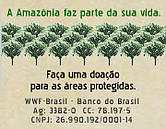
Parque Nacional Yasuní. Foto de Bejat McCracken
O estudo [Global Conservation Significance of Ecuador's Yasuní National Park] foi publicado na PLoS ONE reafirma informações que podem impulsionar o processo de proteção do Parque Nacional Yasuní, com destaque para a proposta do governo de ‘conservação remunerada’.
Os autores também concluem que os projetos de desenvolvimento,a partir da exploração de campos de petróleo, representam a maior ameaça à Yasuní e sua biodiversidade.
O governo do Equador, desde 2007, propõe a ‘iniciativa’ Yasuní, oferecendo a conservação do parque, deixando de explorar as reservas de petróleo, em troca de dinheiro por parte da comunidade internacional.
A falta de receptividade internacional e seguidas disputas internas no governo, levaram o presidente equatoriano, Rafael Correa, a suspender as negociações, timidamente retomadas, no contexto REDD, durante a COP 15.
De acordo com os autores do estudo, a manutenção da área, como um refúgio biológico, deve ser uma “prioridade de conservação global de primeira ordem”. Segundo eles “Se as florestas mais diversificadas do mundo não podem ser protegidas em Yasuní, parece improvável que possam ser protegidas em qualquer outro lugar.”
Global Conservation Significance of Ecuador’s Yasuní National Park
Margot S. Bass1, Matt Finer2*, Clinton N. Jenkins3,4, Holger Kreft5, Diego F. Cisneros-Heredia6,7, Shawn F. McCracken8,9, Nigel C. A. Pitman3, Peter H. English10, Kelly Swing7, Gorky Villa1, Anthony Di Fiore11, Christian C. Voigt12, Thomas H. Kunz13
1 Finding Species, Takoma Park, Maryland, United States of America, 2 Save America’s Forests, Washington D. C., United States of America, 3 Nicholas School of the Environment, Duke University, Durham, North Carolina, United States of America, 4 Department of Biology, University of Maryland, College Park, Maryland, United States of America, 5 Division of Biological Sciences, University of California San Diego, La Jolla, California, United States of America, 6 Department of Geography, King’s College London, Strand, London, United Kingdom, 7 College of Biological and Environmental Sciences, Universidad San Francisco de Quito, Quito, Ecuador, 8 Department of Biology, Texas State University, San Marcos, Texas, United States of America, 9 TADPOLE Organization, San Marcos, Texas, United States of America, 10 School of Biological Sciences, University of Texas at Austin, Austin, Texas, United States of America, 11 Department of Anthropology, New York University, New York, New York, United States of America, 12 Leibniz Institute for Zoo and Wildlife Research, Berlin, Germany, 13 Center for Ecology and Conservation Biology, Department of Biology, Boston University, Boston, Massachusetts, United States of America
Abstract
Citation: Bass MS, Finer M, Jenkins CN, Kreft H, Cisneros-Heredia DF, et al. (2010) Global Conservation Significance of Ecuador’s Yasuní National Park. PLoS ONE 5(1): e8767. doi:10.1371/journal.pone.0008767
Editor: Andy Hector, University of Zurich, Switzerland
Received: April 1, 2009; Accepted: November 17, 2009; Published: January 19, 2010
Copyright: © 2010 Bass et al. This is an open-access article distributed under the terms of the Creative Commons Attribution License, which permits unrestricted use, distribution, and reproduction in any medium, provided the original author and source are credited.
Funding: The Blue Moon Fund, the Conservation, Food & Health Foundation, and the Forrest and Frances Lattner Foundation funded MF. The US National Science Foundation (Graduate Research Fellowship Program), Texas State University-Department of Biology, and TADPOLE funded SM. The US National Science Foundation, the L.S.B. Leakey Foundation, the Wenner-Gren Foundation for Anthropological Research, and Primate Conservation, Inc. funded AD. Establishment of the Tiputini Biodiversity Station supported by the US National Science Foundation–DBI-0434875 (Thomas H. Kunz, PI, with Laura M. MacLatchy, Christopher J. Schneider, and C. Kelly Swing, Co-PIs). The funders had no role in study design, data collection and analysis, decision to publish, or preparation of the manuscript.
Competing interests: The authors have declared that no competing interests exist.
* E-mail: matt@saveamericasforests.org
via Henrique Cortez, em EcoDebate, 29/01/2010




































 Monitoramento da Floresta Amazônica Brasileira por Satélite - PRODES
Monitoramento da Floresta Amazônica Brasileira por Satélite - PRODES Sistema de Detecção de Desmatamento em Tempo Real - DETER
Sistema de Detecção de Desmatamento em Tempo Real - DETER

0 comentários:
Enviar um comentário